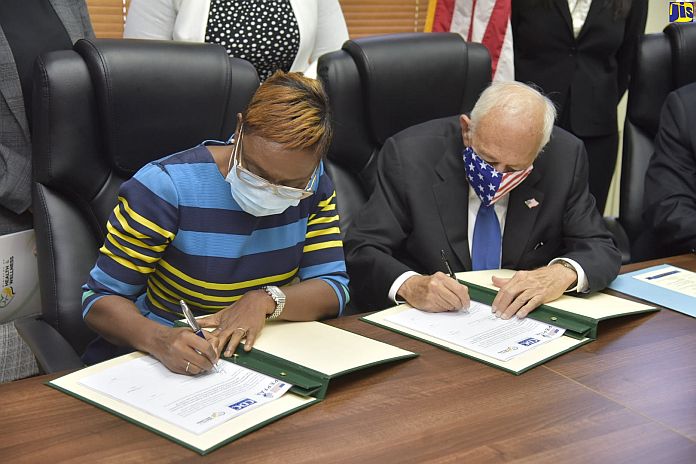By Latonya Linton
KINGSTON, Jamaica, (JIS) – Officials of the ministry of health and wellness and the United States-based Centers for Disease Control and Prevention (CDC) on Thursday, October 1, signed the ‘Strengthening Access to and Delivery of Quality Public Health Services for Prevention, Care and Treatment of HIV, STIs, addressing diseases of public health importance, and advancing global health security in Jamaica under the President’s Emergency Plan for AIDS Relief (PEPFAR) Cooperation Agreement.
The US$3.6 million five-year agreement will focus on supporting strategies for Jamaica’s National HIV Response under three programmatic areas: Prevention, Care and Treatment, and Strategic Information and Laboratory Strengthening.
The document was signed by state minister in the ministry of health and wellness, Juliet Cuthbert-Flynn; United States ambassador to Jamaica, His Excellency Donald Tapia; and director, CDC Caribbean Regional Office, Dr Varough Deyde.
In her remarks at the virtual ceremony, Cuthbert-Flynn said the agreement represents a significant partnership that will help to improve treatment, prevention and care for persons living with HIV.
“With an estimated 32,600 Persons Living with HIV (PLHIV), Jamaica accounts for 59 percent of the burden amongst the four countries supported by the PEPFAR Caribbean Regional Programme; Trinidad and Tobago, Barbados, and Guyana are the other countries involved in the programme,” she said.
“With such a high burden of HIV prevalence in comparison to its Caribbean counterparts, Jamaica must intensify its efforts to improve and transform the HIV response in order to reach the UNAIDS 90-90-90 targets by 2020, and subsequently, 95-95-95 by 2030,” the state minister added.
The targets state that by 2020 some 90 percent of all people living with HIV will know their HIV status, 90 percent of all persons with diagnosed HIV infection will receive sustained antiretroviral therapy, and that 90 percent of all individuals receiving antiretroviral therapy will have viral suppression.
Cuthbert-Flynn pointed out that one of the unintended consequences of the COVID-19 pandemic is that manageable chronic diseases, such as HIV, have received less attention and disruption in treatment and care, resulting in persons becoming uncontrolled.
She noted that the activities under this cooperation agreement will allow Jamaica to refocus and reprioritise key actions that will help the country to meet the 90-90-90 targets.
“For the first year of the agreement, some of these priority actions will include development of the digital HIV/AIDS Confidential Reporting form and validation of data which indicates that 90 per cent of all people living with HIV know their HIV status. These will be carried out under the Strategic Information component of the project,” the state minister said.
Under the prevention, treatment and care component, the peer navigation training manual will be revised and an orientation manual and toolkit for prevention staff developed. Additionally, social media will be utilised as an outreach tool to create linkage to testing and prevention.
Additionally, under the Laboratory component, HIV diagnostic services will be improved with the employment of additional staff at the national public health laboratory.
“A backup machine for viral load testing will be procured and recency testing will be introduced,” Cuthbert-Flynn stated.
For his part, ambassador Tapia said the signing of the cooperation agreement demonstrates the strength of the bilateral relationship between Jamaica and the United States. “I am thrilled that we are strengthening our efforts to work together to address a variety of pressing health issues,” he stated.
Meanwhile, Dr Deyde said the agreement will prioritise the challenges that have been hindering HIV epidemic control in Jamaica.
“Support will focus on strengthening systems and addressing gaps in the lab systems and strategic information, so that it will allow the provision of timely and quality-assured services,” Dr Deyde said. He added that the financing ceiling for the agreement is about $490 million for the first year, of which $140 million has been awarded through the PEPFAR funds.





